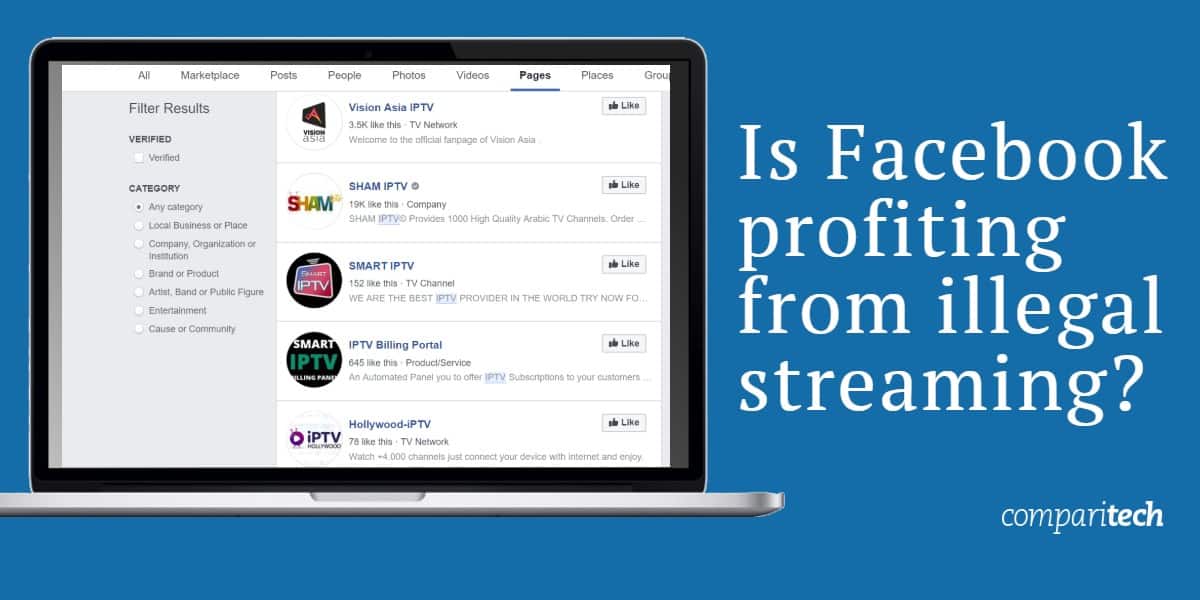
As the “cord-cutting” movement grows to meet increasing consumer demands for low-cost digital TV streaming, it appears that liability protections under the Communications Decency Act (CDA) and the DMCA, as well as potentially lax standards at Facebook, have allowed illegal TV streaming services known as “pirate IPTV” to flourish on the social media platform. Perhaps more worrisome, Facebook’s oversights appear to have allowed the company to generate ad revenue from this form of piracy.
Dozens of illegal IPTV services are currently active on Facebook through unverified product and company pages. Some even purchase Facebook ads, which allows them to reach a larger number of potential customers. However, in flaunting Facebook’s ad approval policy, which explicitly takes a stance against illegal products and services, the continued existence and boldness of pirate IPTV providers on Facebook raises legitimate questions about how far the platform’s “safe harbor” protections should extend.
Additionally, Facebook’s failure to enforce its stated ad review policies against illegal products and services may create financial and privacy risks for its users. Pirate IPTV providers rarely offer refunds, even when they’re forced to cease operations. Some subscribers have also been compelled into paying large legal settlements for using illegal TV streaming services.
We found:
- Dozens of illegal IPTV services openly use Facebook to sign up new customers and engage with users
- Some illegal IPTV services are using paid advertisements on Facebook, calling into question Facebook’s advertisement review and approval process and how far liability protections under the CDA and “safe harbor” through the DMCA should extend
- Illegal IPTV services often differ dramatically in cost, function, and the number of channels advertised versus legitimate over-the-top TV streaming services
- Many illegal IPTV services purposefully mislead potential and current subscribers regarding the legitimacy of the service and its privacy protections
- Some users have lost money to these services, to include legal settlements for usage and lost subscription fees
Illegal IPTV services running rampant on Facebook
Do this:
- Open your Facebook account (unless you’re part of Gen Z and you’ve already ditched Facebook)
- Go to the search bar
- Type in “IPTV”
- Switch the search results to Pages
You’ll now see a long, seemingly endless list of Facebook pages carrying the term “IPTV”, many of which have hundreds of likes. Some advertise their wares (“thousands of TV channels!”) in the description, although many offer tongue-in-cheek discretion in the descriptions until (and sometimes even after) you go to their pages.
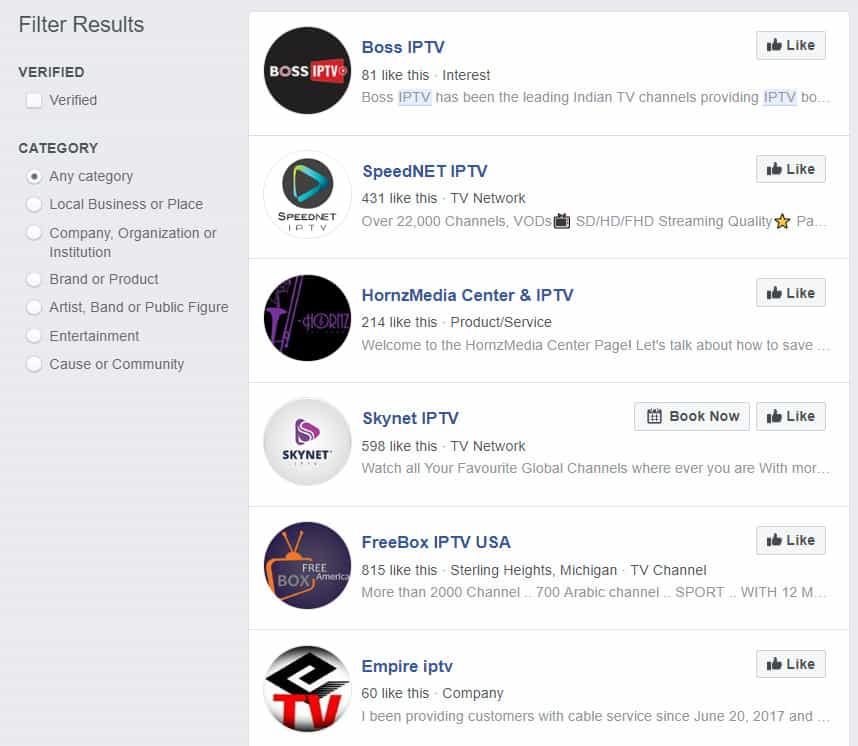
Now, click on the box for “Verified”. That impossibly long list immediately drops down to just three services, none of which even uses the term “IPTV”.
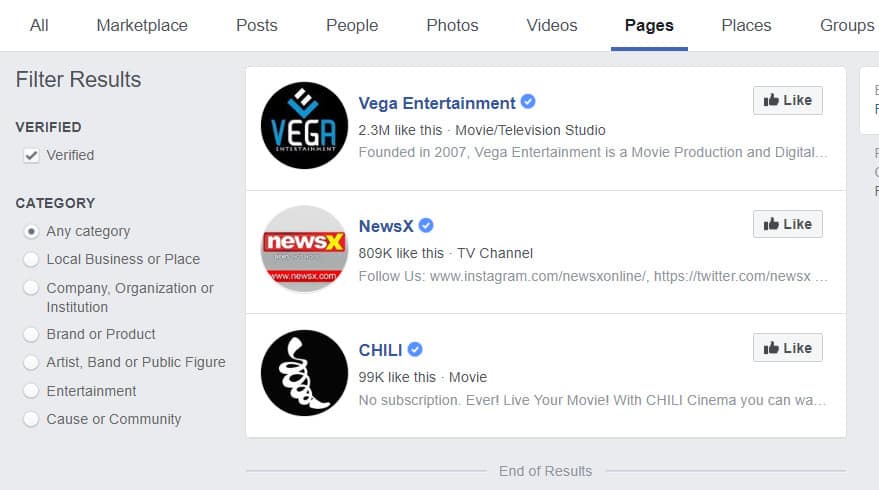
This highlights a stark piracy issue that currently exists on Facebook. The social media platform is filled with unverified “IPTV” services (we could not locate any that were verified) which share one commonality: They’re reselling pirated satellite TV broadcasts to consumers, many of whom do not realize the services they’re subscribing to are engaged in copyright infringement.
What is pirate IPTV?
Illegal or “pirate” internet protocol television (IPTV) services offer live TV over the internet but do not pay carriage fees for retransmission. These services often operate by stealing satellite TV broadcasts. They then employ technology to stream channels over an internet connection and resell those broadcasts to consumers willing to pay the comparatively low subscription fees.

And the costs are indeed comparatively low. The average monthly cable TV bill in the US was $107 in 2018. Meanwhile, the growing library of legitimate “cord-cutting” options through over-the-top (OTT) streaming services offer prices between $15 per month (AT&T WatchTV) to $50 per month (DirecTV Now) for introductory TV streaming packages. Between both traditional cable TV and OTT services, however, the number of channels offered is usually in the dozens, and rarely over 100.
Additionally, legal OTT services that do offer 100+ channels usually do so at a cost approaching traditional cable TV or offer notably less-desirable networks to boost the channel count.
This is why pirate IPTV services have become so attractive to consumers. Even with the lower cost of entry offered by legal OTT services compared to traditional cable TV, many consumers are distinctly attracted to the best deal possible for TV.
The best deals are invariably offered by pirate IPTV services, which can cost less than $20 per month (and at times as little as $5 per month) while still offering hundreds or even thousands of channels, free Pay-Per-View access, premium movie networks like HBO, and video-on-demand.
Questions swirl regarding Facebook’s liability
There’s little question that pirate IPTV services are breaking US and other international copyright laws by reselling satellite TV broadcasts. Several court cases in recent years have proven that such services are not only illegal but also reap huge profits in the process.
Last year, SET TV, one of the largest illegal IPTV providers at the time, lost a lawsuit raised against it by DISH Network and its partner NagraStar. A judge ordered SET TV to pay DISH over $90 million in piracy restitution. The award reflected a payment of $500 for each of SET TV’s 180,398 active users. And in May of this year, a judge ordered SET TV reseller A-Box TV to pay $2 million in piracy restitution under the same complaint.
As it were, both SET TV and its many resellers (including A-Box TV) were active on Facebook. Pirate IPTV services often draw customers to their services on Facebook using pages and posts advertising not just the service in general, but also major sporting events otherwise only available through Pay-Per-View. Such events are regularly broadcast through pirate IPTV services without added costs, a major draw for sports fans looking to evade the high costs of PPV.
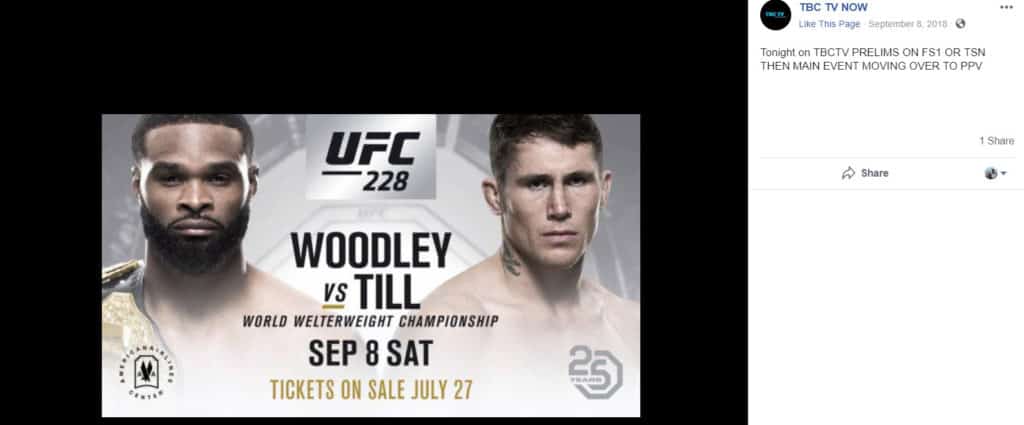
A large question mark exists regarding whether Facebook should have any legal liability for allowing illegal IPTV operations to sell and advertise on its platform. Thanks to “safe harbor” protections from the DMCA, Facebook is protected from copyright liability if it removes infringing material from its service within a reasonable amount of time. But pirate IPTV services rarely, if ever, post any copyrighted content, meaning Facebook has no legal incentive to remove their pages.
Additionally, under Section 230 of the Communications Decency Act, the social media platform may have some wiggle room to avoid liability for use of its platform by pirate IPTV providers.
The relevant text in Section 230 states,
“No provider or user of an interactive computer service shall be treated as the publisher or speaker of any information provided by another information content provider.”
Taken literally, this means Facebook is not responsible for pirate IPTV providers posting about their services, which is how most pirate IPTV operations use the social media platform. This is why rather notable digital piracy forums on Reddit, such as /r/Piracy, are allowed to exist. So long as they post no infringing content, and only make posts about piracy as a concept, social media platforms share no burden of responsibility for the content.
No pirate IPTV operation that wants to survive will post examples of the copyrighted content their services provide, for example. Most usually provide links to their websites to where anyone interested can sign up, or tell subscribers to message them directly on Facebook for more information.
Still, CDA 230 is not all-encompassing. On one of its pages covering CDA 230, the Electronic Frontier Foundation (EFF) notes that the legislation “does not apply to federal criminal law, intellectual property law, and electronic communications privacy law.” This may ultimately leave Facebook in a gray area regarding where its liability protection ends and its responsibility to proactively remove pirate IPTV pages and groups begins.
If anything, pirate IPTV services selling on the platform could be considered a violation of Facebook’s Community Standards, which offer strong language against intellectual property theft.
Facebook profiting from illegal IPTV
Existing laws make it unclear whether Facebook should be taking more action to stop pirate IPTV services from using its platform. However, a more pressing issue resides in its potential profiting from these services.
We located several instances where pirate IPTV services verifiably purchased and ran advertising campaigns on Facebook.
These screenshots represent a few of the examples we located. The “Sponsored” tag under the IPTV providers’ names indicate that these are paid-for advertisements. By consequence, that means these IPTV providers created ad campaigns, received approval by Facebook’s ad reviewers, and then paid Facebook to have the advertisement seen by hundreds or thousands of Facebook users.
According to Section 4 of Facebook’s Ad Policies (Prohibited Content), the service does not allow “illegal products or services” to be approved or sold through ads on the platform.
“Ads must not constitute, facilitate, or promote illegal products, services or activities. Ads targeted to minors must not promote products, services, or content that are inappropriate, illegal, or unsafe, or that exploit, mislead, or exert undue pressure on the age groups targeted.”
While Facebook’s ad policies do not constitute a legal document or requirement on its part, the fact that several illegal services openly purchased ads from Facebook indicates two things:
- First, it signifies a breakdown or at a minimum a stark oversight in Facebook’s advertisement review and approval process that allows illegal services to get advertisements approved.
- Second, Facebook actively collected revenue from such services, and not just passively from its general data collection on users.
This also calls into question where Facebook’s legal protections might end under CDA 230 and the DMCA, and what actions Facebook and digital rights protection groups may want or need to take in order to help prevent the proliferation of these services on the social media platform.
The issue of ads supporting copyright infringement is also not a new one. The organization CreativeFuture, for example, has been following and fighting against the use of legitimate advertisements on piracy websites. Ad-supported piracy is a topic of deep interest to copyright holders worldwide.
How to tell the difference between legal and illegal IPTV
Consumers can avoid both financial and privacy risks by using legitimate OTT services for live TV (also known as virtual multichannel video programming distributors, or vMVPDs) instead of turning to pirated IPTV.
When pirate IPTV services shut down, subscribers are often left scrambling for (and rarely get) refunds, which can result in a financial loss for those who paid for months of service in advance. Additionally, when these services have their assets seized by authorities, they cannot always protect the identities of their users. That information may end up in the hands of law enforcement, who may then forward it to copyright holders.
See also: Best VPNs for IPTV

Some anti-piracy outfits actively pursue lawsuits against pirate IPTV providers. NagraStar, a DISH Network partner, has also collected tens of thousands of dollars in settlement payments from pirate satellite TV users over the years, most of whom were unaware that their TV subscription was illegal. The company regularly posts about pirate IPTV users who were forced to pay settlements.

(Note: NagraStar also has a section on its SatScams website that allows anyone who received a settlement letter from them to pay the settlement online.)
Here are a few tips to help consumers determine if a live TV streaming service is legitimate or a pirate IPTV.
1. Legal TV streaming services never use “IPTV” in their product or company name
This is your first clue. While some illegal IPTV services now go without using the term “IPTV”, no legal services we’ve found used the word in their product name, company name, or any marketing materials. If you see the term “IPTV” in a company’s product name or displayed prominently on its website, it’s likely an illegally-operated service.
2. Legal TV streaming services have a closer cost-to-channels ratio
It’s important for cord-cutters to consider how much it costs a TV streaming service to provide channels within a TV package and still make a sustainable profit. ESPN alone charges over $7 per subscriber for its base channel. Meanwhile, some illegal IPTV services claim to offer ESPN, HBO, Pay-Per-View events, and hundreds more channels and on-demand videos for just $5-$35 per month.
If you see a service that’s offering hundreds or thousands of channels for a price that seems too good to be true, it probably is.
3. Illegal IPTV services may lack an official website, or have a low-effort website in place
TV consumers who stumble onto an IPTV service via Facebook ads or pages should look for a website where that service is selling. If no legitimate website exists, the IPTV service is likely engaged in piracy. Additionally, if a website does exist, but it looks to be of low-quality development, it’s also likely to be an illegal IPTV service.
That said, we’ve also noticed an increasing number of IPTV services investing more money into making professional-looking websites. In these instances, look for an “About Us” page with official contact information. If you can’t find one, the service is likely operating illegally.
4. Check the available apps
Every legal IPTV service on the market has dedicated apps available through official app stores from major operating systems and devices. For example, you can download a YouTube TV app directly for iOS, Android, Apple TV, Roku, Amazon Fire TV, and some smart TVs.
Illegal IPTV services, however, will never have a named app available for their service in any official app stores. Instead, they often instruct subscribers to download an app called SOPlay or SOPlayer, which will pair with the IPTV service’s account.
Additionally, every legitimate TV streaming service we’ve explored works with Roku and has a Roku app. Roku has a very strict anti-piracy policy in place, so if there is no Roku app available and no functionality with Roku is listed, the service is likely an illegal IPTV operation.
5. Illegal IPTV services often only accept PayPal and cryptocurrencies
Some pirate IPTV services try to minimize their footprints by only accepting payments from PayPal or cryptocurrencies like Bitcoin. This is not always true, as some services do accept major credit cards. However, no legitimate TV streaming services only accept PayPal, and none that we’ve seen (at this time) accept cryptocurrencies.
Additionally, be wary of any IPTV provider that wants you to make PayPal payments using the “Friends and Family” option instead of the “Goods and Services” option. This is not only against PayPal’s policies but is designed to help the IPTV provider avoid PayPal’s service fees and eliminate your ability to get a refund.
6. Be wary of services that communicate through Telegram or other encrypted messaging services
Telegram is a secure messaging service designed for encrypted messaging. The service is designed to leave no trace of communication. Some IPTV providers utilize Telegram to communicate with subscribers specifically because they know their operations are illegal and do not want to leave any record should authorities come knocking.
7. Ask the service provider how it can afford to offer that many channels for the price
If the number of channels compared to the cost seems suspicious, ask the IPTV provider how it can afford to offer that many channels and still pay carriage fees. We’ve found illegal IPTV providers get shifty when asked to provide this evidence, and we were even been blocked from commenting on one pirate IPTV provider’s Facebook page (TBC TV) after asking this question on one of its posts.
8. Check for the blue “Verified” checkmark on Facebook
If you find an IPTV or internet TV provider on Facebook, check to see that it has the blue “Verified” checkmark by its name. We have been unable to locate any illegitimate streaming services with verified pages. Meanwhile, legitimate OTT services, such as Philo, fuboTV, DirecTV Now and others all have the verified checkmark.





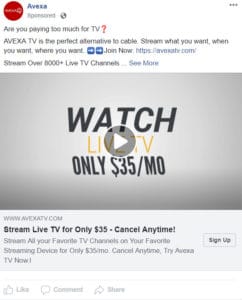







Really nice and well described tips and tricks. Thanks for sharing the article.